|
|
|
Sort Order |
|
|
|
Items / Page
|
|
|
|
|
|
|
| Srl | Item |
| 1 |
ID:
088767


|
|
|
| 2 |
ID:
141723
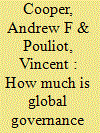

|
|
|
|
|
| Summary/Abstract |
Is the G20 transforming global governance, or does it reinforce the status quo? In this article we argue that as innovative as some diplomatic practices of the G20 may be, we should not overstate their potential impact. More specifically, we show that G20 diplomacy often reproduces many oligarchic tendencies in global governance, while also relaxing club dynamics in some ways. On the one hand, the G20 has more inductees who operate along new rules of the game and under a new multilateral ethos of difference. But, on the other hand, the G20 still comprises self-appointed rulers, with arbitrary rules of membership and many processes of cooption and discipline. In overall terms, approaching G20 diplomacy from a practice perspective not only provides us with the necessary analytical granularity to tell the old from the new, it also sheds different light on the dialectics of stability and change on the world stage. Practices are processes and as such they are always subject to evolutionary change. However, because of their structuring effects, diplomatic practices also tend to inhibit global transformation and reproduce the existing order.
|
|
|
|
|
|
|
|
|
|
|
|
|
|
|
|
| 3 |
ID:
132028
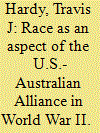

|
|
|
|
|
| Publication |
2014.
|
| Summary/Abstract |
World War II marked a watershed for American diplomatic practice as the nation moved away from its traditional ideas of unilateralism toward a foreign policy based on the construction of foreign alliances and relationships. Many of those relationships continue to be a central part of American diplomacy and one of the strongest is the American relationship with Australia. Historical study of the American-Australian alliance traditionally focused on how the alliance came into being because of the economic relationship between the two powers or because of the exigencies of World War II in the Pacific. What emerged from these studies was an overly simplistic understanding of what was dynamic and complex relationship between two states who often found themselves at cross-purposes. This essay points to the presence of a shared sense of racial identity among the general populaces and how this was utilized by policymakers to ameliorate the contentious nature of the alliance during the war. The creation of the American-Australian relationship was often as much driven by ideas of how the world was ordered as it was by the reality of events facing the two states during the war.
|
|
|
|
|
|
|
|
|
|
|
|
|
|
|
|
| 4 |
ID:
175661
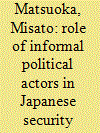

|
|
|
|
|
| Summary/Abstract |
Japan’s security policymaking has undergone change since 2012 amidst institutional reforms under the second Abe Shinzō administration. This article explores the under-appreciated role of informal political actors—especially heavyweight academics—in shaping Japanese security policymaking under the second Abe administration. Although these actors have always been present, this article argues that they have become more visible and influential, especially under the second Abe administration by supporting Japan’s Realpolitik stance. Differentiating from ‘embedded scholars’ (goyō gakusha), it scrutinises whether the activities of academics have become more relevant as part of a more centralised policymaking process. Considering the existing literature on Japan’s security policymaking and Kantei diplomacy, this article examines the extent to which informal political actors have exerted influence on Japan’s security policymaking, with explicit comparison with earlier governments. It particularly focuses on the role of Kitaoka Shin’ichi, a Japanese academic who has played the central role in shaping Japan’s security policymaking in the post-Cold War period. In so doing, this article explores the ways in which Abe’s Kantei-led political decision-making style has empowered informal political actors to contribute to strategic thinking regarding Japanese foreign and security policy.
|
|
|
|
|
|
|
|
|
|
|
|
|
|
|
|
| 5 |
ID:
192007
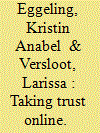

|
|
|
|
|
| Summary/Abstract |
Can trust – a core element of diplomacy – be taken online and if so, how? This article starts form the concern that trust is tied to face-to-face diplomacy, which is challenged in digitalising settings. We adopt a practice theoretical lens and study diplomatic information sharing in the Council of the European Union. Drawing on fieldwork from 2018–2021, we find that digital tools are indispensable for trust's enactment and, contrary to commonly held assumptions, do not negatively impede diplomatic trust, per se. Theorising from how diplomats handle digital tools, we find that this leads to a renegotiation of the place and boundaries of trust in diplomatic work. First, we show how digital tools create both new opportunities for and challenges to diplomatic trust, though these opportunities are more accessible to some than others. Second, whereas trust is taken online, it is not easily built digitally. Third, digital tools lead to a rearticulation of the place of transparency and confidentiality in diplomatic negotiations. It pushes diplomats to reconsider what it means to share information in an (un)trustworthy manner. Altogether, these findings further our understanding of contemporary diplomatic practice and offer a refined conception of diplomatic trust.
|
|
|
|
|
|
|
|
|
|
|
|
|
|
|
|
| 6 |
ID:
174389
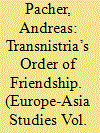

|
|
|
|
|
| Summary/Abstract |
What strategies do de facto states employ in conducting their diplomacy? This article examines Transnistria’s Order of Friendship, a state award that primarily targets foreigners, by analysing the profiles of all known award recipients. The Order is found to be a political tool to enhance Transnistria’s domestic and external legitimacy in the absence of recognised sovereignty. The findings confirm the literature on Transnistria’s ‘bandwagoning’ with Russia, indicate that a patron’s support must be actively sought rather than taken for granted, and—since many awardees are from jurisdictions other than the patron state Russia—point to the need to examine the foreign policy of de facto states more holistically.
|
|
|
|
|
|
|
|
|
|
|
|
|
|
|
|
|
|
|
|
|